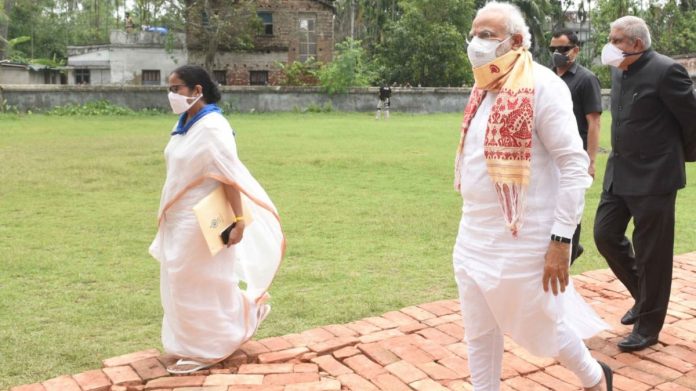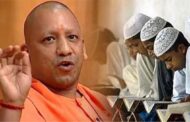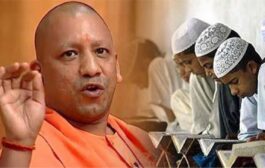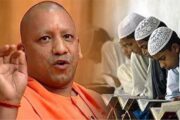The Centre owes West Bengal a hefty sum of more than 10,000 crore. Rather than talking of giving ‘advance’ or ‘aid’ of only 1000 crore, the central govt should first pay what it owes to the state

Photo Courtesy: Social Media
Four districts devastated, electricity and water supply mangled out of whack, mobile networks mostly down, river embankments smashed, millions of people rendered homeless, thousands of acres of farmland and hundreds of villages inundated, cut off from help.
West Bengal has been laid to waste by cyclone Amphan, which pummelled the state for over five hours on Wednesday afternoon and plunged lives and livelihoods into darkness.
Large parts of the worst-hit districts, South 24 Parganas, North 24 Parganas, Kolkata and Howrah, all densely populated, are without power and water more than two days after what many Calcuttans described as the scariest storm ever.
Chief Minister Mamata Banerjee has wept in public and said the last time a calamity of this scale had struck Bengal was in 1737. She estimated the cost of destruction at Rs 1 lakh crore.
Prime Minister Narendra Modi, after being silent for nearly a day, tweeted his concern and then rushed to the state as if sprung into action by the social media outrage. Because the worst cyclone ever recorded in the Bay of Bengal barely found mention in India’s communalism-obsessed national media (read TV channels).
At least 80 people are dead at first count, 15 from state capital Calcutta. Protests have erupted across the city, as well as other parts of the state, because of the lack of electricity and water. Police have lathicharged at least one protest, in Uttarpara.
“Kolkata puro junglemahal hoye gachhe (Calcutta has become a jungle),” quipped a driver who has been ferrying reporters.
He was referring to the 5,000-plus trees that have been uprooted across the city. It is these trees, which took most of the battering, that have brought down the power lines. Some of the trees are so big that it takes eight hours of work to clear one. Initial reports suggest that 40 per cent of the tree cover of one of the greenest states is gone.
Many areas in Calcutta did not have power and/or water till late on Friday night. Local channels and social media are full of accounts of tragedy and trauma: Books worth millions destroyed in College Street, Calcutta’s “boi para” (neighbourhood of books), windows smashed in high-rises and terrified people recounting how they were cowering as the storm hit the city like a bunch of Godzillas, people from outside Calcutta not being able to contact their elderly parents.
The areas beyond the state capital have been much worse hit.
In South 24 Parganas, 2.5 lakh trees have reportedly been uprooted. In Gangasagar in the same district, 95 per cent of houses have been destroyed, according to Bengali TV channels.
Prime Minister Modi undertook a whirlwind tour of the affected areas on Friday morning with the chief minister and governor Jagdeep Dhankhar in his helicopter.
Modi said the Centre would send teams to survey the damage done to different sectors such as trade and agriculture, and that the Centre would work “shoulder to shoulder” with the state government to get West Bengal “back on its feet”.
He announced an “immediate assistance” of Rs 1,000 crore to the state government, Rs 2 lakh ex-gratia to the family of every Amphan fatality and Rs 50,000 to each person injured. The state government has also announced Rs 2.5 lakh per fatality.
Crop losses are tremendous, factoring in that the state is the leading grower of rice and vegetables in India and in the top three in terms of fish and meat production. The effects are thus likely to travel much beyond the state borders.
Modi slipped in a word of praise for the West Bengal Chief Minister as well, saying that the state government had handled well the conflicting dual challenges of the coronavirus and the cyclone. One requiring people to stay home, and the other requiring people to move to safe areas.
That the BJP has its eyes on West Bengal is not a secret, neither is the rise in its popularity among the people of the state. The Assembly elections in 2021 will be a direct contest between Mamata and the BJP, and it will by no stretch of imagination be a Goliath versus David battle.
Political jostling over who is delaying relief is likely to become a key feature as the poor, mostly agrarian state — where millions of lives were already plunged into uncertainty by the purported cure for a virus — grapples with the after-effects of a bulldozer blow to their lives and livelihoods already locked down for months with four-hour notice.
The south-eastern part of West Bengal has been reduced to a rubble. It will take quite some time before the state recovers.







































